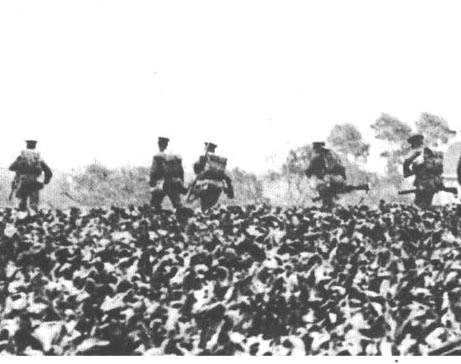The Great War & Modern Enchantment
By:
November 11, 2009

The Guardian’s Alastair Harper offers a paean to the voices of the Great War— the first European war, as has been observed from many perspectives, to have been fought in the public sphere. Many combatants brought a literary education with them to the war — and offered their witness, nuanced and unvarnished, to the home front. “Before 1914, of those who described war, painted it and wrote poetry about it, very few had seen battle themselves,” Harper writes. “Now a generation of the literary middle class had, and found it by turns mundane, draining and horrific.”
But if the literary accounts of the war in verse and prose helped civilians to comprehend the horrors of war, the public sphere in which those accounts circulated could be a medium of bewitching glorification as well. Nothing illustrates the point better than the tale of Arthur Machen and “The Angels of Mons.”
Machen was a neo-Romantic author and newspaper columnist who wrote fey tales of enchantment and horror. His books were popular in an Edwardian culture that swirled technology and science with Spiritualism and magic, in which disembodied voices on the radio and flying machines in the air mingled with the dancing of Earth spirits and the chants of the dead. When war broke out, Machen was serving as a columnist for London’s Evening News. In the aftermath of the first major engagement of the war — the Battle of Mons, when the British held back a German advance while retreating to the outskirts of Paris —Machen wrote a story for his column called “The Bowmen.” In it, he imagines an intervention in the battle by the ghosts of British yeomen who fell at the 15th-century Battle of Agincourt, led down to battle from the clouds by the spirit of St. George.
In Machen’s tale, the divine intercession is brought about by a soldier with a bit of literary learning (the very type of bourgeois Tommy identified in Harper’s Guardian column). In the heat of battle, as the German horde bears down on the faltering British line, the soldier unaccountably recalls a restaurant plate emblazoned with the motto Adsit Anglis Sanctus Georgius, invoking the aid of Saint George on England’s behalf. “(A)s the Latin scholar uttered his invocation,” Machen continues, “he felt something between a shudder and an electric shock pass through his body —
The roar of the battle died down in his ears to a gentle murmur; instead of it, he says, he heard a great voice and a shout louder than a thunder-peal crying, “Array, array, array!”
His heart grew hot as a burning coal, it grew cold as ice within him, as it seemed to him that a tumult of voices answered to his summons. He heard, or seemed to hear, thousands shouting: “St. George! St. George!”
“Ha! messire; ha! sweet Saint, grant us good deliverance!”
“St. George for merry England!”
“Harow! Harow! Monseigneur St. George, succour us.”
“Ha! St. George! Ha! St. George! a long bow and a strong bow.”
“Heaven’s Knight, aid us!”
And as the soldier heard these voices he saw before him, beyond the trench, a long line of shapes, with a shining about them. They were like men who drew the bow, and with another shout their cloud of arrows flew singing and tingling through the air towards the German hosts.
Machen’s story appeared in September 1914, barely a month after the battle. By April 1915 it had been reprinted in numerous venues from church newspapers to Spiritualist magazines. Among the most credulous storymongers were parish priests who relayed the tale in sermons and published it in pamphlets and bulletins.
Along the way, it became true. There were reports of other eyewitnesses to the supernatural spectacle and accounts of numerous ghosts, angels, and spirits at the Front. Although Machen released the story in book form with a preface asserting the fictional nature of the tale, versions attesting the tale’s veracity continued to circulate. Later, some would suggest that the apparition had been a figment of shell-shocked imaginations of the retreating soldiers; others argued it had been a conspiracy of the War Office, proffering spellbinding propaganda to a credulous public.
After the war, Walter Lippmann famously argued that the circulation of news during the conflict demonstrated that the public sphere could not serve a salutary purpose in society. Stereotypes and parochial perspectives assure that news, opinion, and comment are never better than glorified rumor; the notion that the media offer citizens the information they need to participate in public life is either quixotic or mendacious.
Lippmann’s view became the conventional wisdom, and the tale of the Angels of Mons would seem to illustrate his point. But I’m not so sure. Because after all, wartime readers were exposed not only to glorious visions of righteous intercession, but the bitter testimony of the war poets as well. Not only adsit anglis, but dulce et decorum est.
Like war, the public sphere is messy, agonistic, and uncertain. Better a war of stories and ideas — a trench-fought battle of myths, fables, and bitter witness — than the divine sleep of reason.
— crossposted at library ad infinitum
